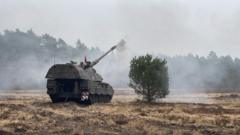On the front lines in Ukraine, military leaders stress the importance of staying vigilant amid ongoing battles, dismissing the notion of an immediate cease-fire as mere fantasy.
Drones, Mines, and Doubts: Soldiers in Ukraine Ignore Talks of Cease-Fire

Drones, Mines, and Doubts: Soldiers in Ukraine Ignore Talks of Cease-Fire
Ukrainian soldiers remain focused on the intense realities of combat despite diplomatic discussions of peace.
Hunted by drones, stalked by snipers, and surrounded by minefields, soldiers fighting in Ukraine remain steadfast in their commitment to the battle at hand. Col. Dmytro Palisa, leader of the 33rd Mechanized Brigade, emphasizes the need for his troops to maintain focus, advising against any speculation regarding possible cease-fires. “They start relaxing, they start overthinking, putting on rose-colored glasses, thinking that tomorrow will be easier. No,” he remarked during a recent interview at a front-line command post. “We shoot until we are given the order to stop.”
As diplomats far from the battlefield discuss potential truces, the fighting in Ukraine rages on, as fierce as ever. This ongoing conflict serves two primary purposes: it is a strategic maneuver to gain ground ahead of potential negotiations, while also reflecting profound skepticism about the prospects for peace. While there are discussions about interim measures—like reducing violence in the Black Sea area—very few soldiers or civilians harbor hopes that these efforts will translate into a lasting resolution. Instead, both sides are primarily focused on solidifying their positions for any future confrontations.
As the war continues without respite, the reality of life on the front lines stands in stark contrast with the distant deliberations of peace talks. The engagement in battle underscores that the struggle for dominion over the region—both on the ground and at the negotiating table—remains as fierce as ever.
As diplomats far from the battlefield discuss potential truces, the fighting in Ukraine rages on, as fierce as ever. This ongoing conflict serves two primary purposes: it is a strategic maneuver to gain ground ahead of potential negotiations, while also reflecting profound skepticism about the prospects for peace. While there are discussions about interim measures—like reducing violence in the Black Sea area—very few soldiers or civilians harbor hopes that these efforts will translate into a lasting resolution. Instead, both sides are primarily focused on solidifying their positions for any future confrontations.
As the war continues without respite, the reality of life on the front lines stands in stark contrast with the distant deliberations of peace talks. The engagement in battle underscores that the struggle for dominion over the region—both on the ground and at the negotiating table—remains as fierce as ever.





















